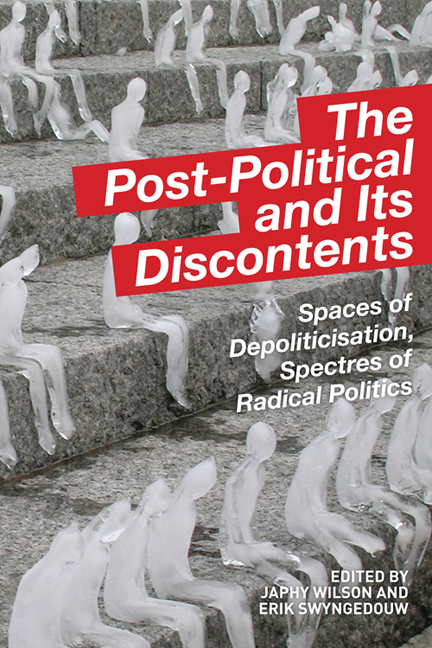Book contents
- Frontmatter
- Contents
- List of Contributors
- Seeds of Dystopia: Post-Politics and the Return of the Political
- Part I Spaces of Depoliticisation
- 1 The Post-Politics of Sustainability Planning: Privatisation and the Demise of Democratic Government
- 2 The Post-Political and the End of Nature: The Genetically Modified Organism
- 3 The New Development Architecture and the Post- Political in the Global South
- 4 Opening Up the Post-Political Condition: Multiculturalism and the Matrix of Depoliticisation
- 5 The Jouissance of Philanthrocapitalism: Enjoyment as a Post-Political Factor
- 6 Religious Antinomies of Post-Politics
- 7 Post-Ecologist Governmentality: Post-Democracy, Post- Politics and the Politics of Unsustainability
- Part II Spectres of Radical Politics
- There Is No Alternative
- Index
1 - The Post-Politics of Sustainability Planning: Privatisation and the Demise of Democratic Government
from Part I - Spaces of Depoliticisation
Published online by Cambridge University Press: 05 August 2016
- Frontmatter
- Contents
- List of Contributors
- Seeds of Dystopia: Post-Politics and the Return of the Political
- Part I Spaces of Depoliticisation
- 1 The Post-Politics of Sustainability Planning: Privatisation and the Demise of Democratic Government
- 2 The Post-Political and the End of Nature: The Genetically Modified Organism
- 3 The New Development Architecture and the Post- Political in the Global South
- 4 Opening Up the Post-Political Condition: Multiculturalism and the Matrix of Depoliticisation
- 5 The Jouissance of Philanthrocapitalism: Enjoyment as a Post-Political Factor
- 6 Religious Antinomies of Post-Politics
- 7 Post-Ecologist Governmentality: Post-Democracy, Post- Politics and the Politics of Unsustainability
- Part II Spectres of Radical Politics
- There Is No Alternative
- Index
Summary
In March 2012 the UK government introduced a new National Planning Policy Framework with the intention of modernising and reforming the English planning system. The core contents of the framework represent the latest manifestation of the output-centred post-political rhetoric that has dominated discourses of development since the late 1970s. Its opening words state that ‘the purpose of planning is to help achieve sustainable development’, and as with many contemporary planning statements it claims to reflect and help to reproduce international understandings of so-called Good Governance, while helping to ‘balance’ the competing needs of economic development, social inclusion, and environmental protection. As many authors have noted, the term ‘sustainable development’ has become something of a cliche that is used to justify a range of programmes that carry differing, and sometimes competing and contradictory, objectives. Over recent decades it has become increasingly flexible with critics of global capitalism drawing on sustainability discourses to argue that there should be ‘prosperity without growth’ (Jackson 2011), whilst others on the Right simultaneously use it to legitimate discourses of neoliberal capitalism and commodity-based expansion. For Swyngedouw (2009) it has therefore come to represent an impossible, post-political construction that is driven by ‘non-ideological’, pragmatic win-win interventions to tackle ‘wicked problems’, in which there are no losers and only winners.
This chapter draws on some of the key principles associated with the literature on post-politics to make sense of contemporary discourses of sustainability planning. It focuses on the relationships between contemporary uses of the discourse of sustainable development in the modernisation of the English planning system and wider changes in the political economy of capitalism. It argues that we are witnessing the establishment of a specific form of post-politics, underpinned by a contradictory anti-utopian utopian project. This contains many of the elements of post-political structures outlined by Ranciere, Swyngedouw and others. It is focused on output-centred forms of legitimacy built around the empowerment of managerial elites; it is embedded in a discourse that undermines the value of egalitarian-based modes of democratic participation; and it purposefully removes the institutional links between decision-making, accountability, and state practices.
- Type
- Chapter
- Information
- The Post-Political and Its DiscontentsSpaces of Depoliticisation, Spectres of Radical Politics, pp. 25 - 47Publisher: Edinburgh University PressPrint publication year: 2014

